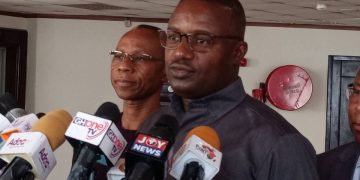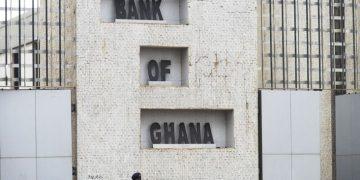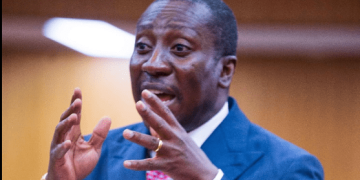Our multi-party democracy is under threat from a narrow clique who are pursuing their selfish interests, suppressing dissent and dispensing patronage to only die-hard supporters.
The rest can go hungry. The period 1992 to the present day and living under a radicalised, extremist “progressive” Constitution has seen a significant rise in indiscipline and aversion to criticism from our politicians. Indeed, criticism is routinely suppressed, often violently and sometimes subtly with the help of paid media.
While criticism can help in many ways to advance creativity and innovation, our politicians have done much to stigmatise it as negative, bringing fascination, passion, fun and inspiration out of our politics. Dissent, words and thoughts are treated as if they are crimes. Most times the angry response to criticisms are so outrageous they become headline news.
Whatever the factors may be at play, there is one overwhelming reason at the very heart of today’s radical, unprecedented pressure to crush dissent if possible. The elites – from both major parties — are all obsessed with increasing their power and wealth. It follows, then, that truthful speech, which serves to expose, undermine and defeat their self-serving agendas, constitutes the greatest threat to their agenda, which in turn compels them to crush dissent at all costs. That is the very essence of totalitarianism; the people are just ‘useful idiots’ to be manipulated.
We acknowledge that every village has its idiot. The word in its literal and traditional sense, refer to “a person deficient in mind and permanently incapable of rational conduct.” Indeed, every village throughout the whole world has always had, at least, one idiot. A real village idiot is mentally disabled and is, therefore, unable to grasp or grapple with any idea, good or bad. The ‘village idiot’ is innocent of the criminal negligence of the mind.
However, there is another ‘idiot’. This ‘idiot’ is capable of rational conduct but refuses to reason. In politics, they are known as ‘useful idiots’. Politicians use them to achieve their goals and dump them. These go to political rallies, pump their fists, and shout themselves hoarse, collect some small money, then wander off, never bothering to find out what happened next.
Then there is the ‘leader idiot’. His ‘idiocy’ is acquired. He is not “deficient in mind” but bereft of vision and defective in reasoning. He has so internalised the beliefs, values and customs of the colonialists that he is confused as he struggles with his inner being. He lacks any ideological commitment. His claims to be a pragmatist is just an excuse to be involved in tactics that achieve his ends, than inflexible idealistic ones. His idea of going into politics is to amass wealth, not to serve and so collaborates with foreigners, friends and family to scoop up this country’s resources for a song. An attitude not seen under the colonialist. Where does his value come from? Did his ancestors value money this much, or did he get this priority from the colonising culture?
It is not the “village idiot’s” fault that nature dealt him or her a lousy hand in birth. He is a natural-born idiot and makes no demands on being recognized as a model of wisdom and insight. However, we can find fault with the other ‘idiot’ whose mind is colonised and his actions and mistakes make people lose their savings, their homes, their ability to eat well, or their chance to have life-saving health care.
Ghana is a country of nearly 40 million people, about fifty per cent of whom are desperately poor. Most of us cannot even comprehend how we live our lives — on less than US$ 2 equivalent a day. Most children are malnourished and have no prospects of ever realizing their potential. Most people in rural areas have no access to clean drinking water or sanitation. The quality of education is questionable. Nearly a third of children, with a semblance of education would never get a decent job.
For nearly all of its existence as an independent political entity, the same group of narcissist ‘leader idiot’ —- elites —– never mind the political grouping, has ruled Ghana. Most of these leaders have become overly ambitious and corrupt, to the point where they are willing to destroy their people for more power. In our putrid corrupt culture, the economic system they create and supervise empowers no one but themselves. Right now, Ghana is broken, and every time we compromise the ‘leader idiot’, it costs us money.
Many of the economic challenges we face today, including inflation, debt, and a distrust of our political and business leaders, sound all too familiar. We, the people, are afraid to ask questions. Being mediocre and paranoid, our leaders hate criticism. Their hateful rhetoric targeting critics is an established technique to unify and mobilise ‘useful idiots’ and to criminalise and dehumanise political critics and opponents for selfish gain. Hate speech by politicians also serves to deepen political polarisation.
The character of most of our leaders should make us weep and keep us awake at night. They are corrupt, incompetent, lying, myopic, immoral idiots —, which they are — but interestingly, the character of our leaders is a sure indication of the character of all of us. We hate debate and we hate criticism.
In this man-made environment of harsh economic conditions ready to be exploited by manipulative, cynical, selfish, callous and arrogant demagogues, everything critics say or do elicits name-calling. The most popular include ‘too known’, ‘controversial,’ or appeals to partisans not to rock the political boat. Meanwhile, there is a lot of bad behaviour going on — and perpetrators getting away with it, too. It feels like an epidemic. Our ruling caste exploits the idiocy of a disengaged electorate, who are ready to proclaim politicians saviours, not servants.
This is not normal. Despite all the expected good that must be found in this country, the big picture is worrying and darkening. We have lost the way. Our institutions do not work. Our ability to work with integrity and trust has become a clown show. Indiscipline is on the rise and the majority of citizens do not believe that the future would be better than the past. Yet, some of us just cannot handle the truth.
For the sake of our country — and for it to survive as a nation – we have to change. The assumption that things will work with our passivity and mental envisioning things is what allows our politics to get away with its shenanigans. We have to change. We have to evolve. We have to grow. We want to get back to being Ghanaians. We are the Party of Danquah. We are also the Party of Kwame Nkrumah and Jerry Rawlings. We are all those things, but we have to change. Our forebears did not insult elders and were killed for money. Nothing works without discipline, independence, personal responsibility and debate.
We are not made to be calm and collected ‘village idiot’ who seeks to live pain-free within themselves. We are made to be widely awake and to challenge the status quo to make Ghana a better place. As long as we have a worldview centred on ourselves, we will be miserable. If we hope to overcome this plague of modern misery, we must embrace an attitude of gratitude. We must count ourselves blessed for the history we inherited and curse the history we are creating.
Bottom line: Most of our leaders simply cannot stand truthful expression because it exposes both them and their self-serving agendas for what they are. Political parties are formed to reflect the variety of people’s views, interests, and needs, from their highest ideals to their basest instincts.
Here is the deal: We should assert our right to debate and criticism. We should refuse to bow down and let politicians use us as ‘useful idiots’. We should not be afraid of name-calling. Ghanaian citizens and voters should wake up, as election season gets underway, smell the putrid stench of decay, pray and engage to see a turnaround in beautiful Ghana before it is too late. We need to chase the ‘useful idiots’ out of our politics and do away with the evil camouflaged by rhetoric and disguised as humanitarian concern and compassion.
The abrasive words of critics may be confrontational and offensive — but it is also life-changing.
By Kwadwo Afari




















































































